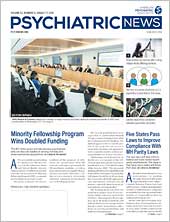Mental health education laws took effect last month in two states—New York and Virginia—that require their schools to provide mental health instruction for students as part of the health curriculum.
A small number of states have laws requiring mental health education or training, but only for teachers. New York was the first state to pass a law mandating mental health instruction for students. The Mental Health Association in New York State Inc. (MHANYS) led a six-year lobbying effort for the measure, explained John Richter, MHANYS director of public policy.
New York’s law is meant to improve the mental health literacy of youth so that they can prevent, recognize, and seek help for mental health problems in themselves and others. While students there are already taught about such mental health concerns as alcohol, drug, and tobacco use, the bill noted, “Equally critical, but missing from current law and often the classroom, is the recognition that mental health is as important to health and well-being as physical health.”
A recent CDC report underscores the urgency of boosting the mental health literacy of students: the U.S. suicide rate increased 30 percent over the past 15 years. A particularly troubling trend emerged for young girls: while it still represents a small number, there was a 300 percent increase in the suicide rate for girls aged 10 to 14 and an 80 percent jump for girls aged 15 to 24 during that time, the CDC reported. Half of all chronic mental illnesses begin by age 14.
The law does not mandate specific topics or material to be taught, but rather provides flexibility to New York school districts to develop their own curriculum. The new instruction standard applies to all elementary, middle, and high school students, and it applies to all schools under the purview of the State Education Department, both public and private.
MHANYS received a $1 million appropriation in the state budget to establish a School Mental Health Education Resource and Training Center, which will help school districts implement the law. The center will hold a series of in-person summits for educators, as well as offer webinars, free teacher training, and lesson plans.
Virginia Law Spearheaded by High Schoolers
The Virginia law requires schools to recognize the multiple dimensions of health by including mental health and the relationship of physical and mental health in its instruction. The law also directs the state’s Board of Education to review and update its Health Education Standards of Learning for students in the ninth and 10th grades to include mental health, in consultation with mental health professionals.
“Health education that respects the importance of mental health and the challenges of mental illness will help young people and their families feel more comfortable seeking help, improve academic performance, and save lives,” according to the legislation.
Virginia’s law was spearheaded by three high school seniors: Lucas Johnson, Alexander Moreno, and Choetsow Tenzin. Although each attended a different high school in Albemarle County, they “clicked instantaneously” after meeting at a student leadership institute and realizing they were all “very passionate on the issue of mental health,” Johnson told Psychiatric News. For all three students, the issue was personal: Johnson said a good friend “out of the blue” told him she wanted to die by suicide, despite having a long list of academic and extracurricular successes.
“It really hit home for me how little I knew about the issue of depression or mental illness and how little I knew about how to help,” he said. “I resolved that not only would I learn what to do in these situations, but I realized that this is something that really needs to change for all students.”
For Moreno, a student one grade ahead at his school had died by suicide, and he’d seen many other classmates battling mental health issues too, he said. A close relative had also suffered from depression and found it difficult to obtain help.
All three students were rising seniors and each had a decade of health classes under their belts when they began researching the issue of mental health education in Virginia.
“None of us really remembered any discussion around mental health during our health classes,” Johnson said.
When the trio reviewed Virginia’s health education standards, they found that there was no section dedicated solely to mental health, and although there were snippets scattered throughout the curriculum, “there was no cohesive and coherent message on mental health,” Johnson said.
Albemarle schools provided information sheets called “stall talks” posted in the high school bathroom stalls about subjects such as relationship problems, substance use, and mental illness, Moreno said. “But when you’re having a crisis at 1 o’clock in the morning, you’re not going to be able to run to the school bathroom stall.” The students impressed upon the school board that more resources were needed and won more online mental health resources, as well as $160,000 in next year’s budget for dedicated mental health counselors to serve the student body.
Buyoed by this success, they then met with Virginia state Sen. Creigh Deeds, who decided to sponsor the students’ mental health education bill at the state level. The students testified in front of the state’s House and Senate education committees, sharing their personal stories and research. Eventually, they returned for the bill signing ceremony.
Unlike the New York bill, the Virginia bill requires a change in the curriculum only for ninth and 10th graders, but the students hope the effort will be expanded to other grades.
“We’re trying to make mental health education a rite of passage for all Americans,” Johnson said. ■
New York’s law can be accessed
here. Virginia’s law is posted
here.
